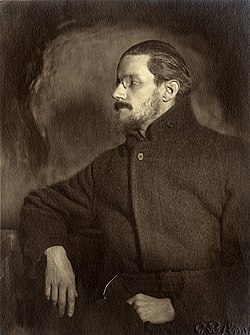James Joyce Quote
A day of dappled seaborne clouds.The phrase and the day and the scene harmonised in a chord. Words. Was it their colours? He allowed them to glow and fade, hue after hue: sunrise gold, the russet and green of apple orchards, azure of waves, the greyfringed fleece of clouds. No, it was not their colours: it was the poise and balance of the period itself. Did he then love the rhythmic rise and fall of words better than their associations of legend and colour? Or was it that, being as weak of sight as he was shy of mind, he drew less pleasure from the reflection of the glowing sensible world through the prism of a language manycoloured and richly storied than from the contemplation of an inner world of individual emotions mirrored perfectly in a lucid supple periodic prose?
A day of dappled seaborne clouds.The phrase and the day and the scene harmonised in a chord. Words. Was it their colours? He allowed them to glow and fade, hue after hue: sunrise gold, the russet and green of apple orchards, azure of waves, the greyfringed fleece of clouds. No, it was not their colours: it was the poise and balance of the period itself. Did he then love the rhythmic rise and fall of words better than their associations of legend and colour? Or was it that, being as weak of sight as he was shy of mind, he drew less pleasure from the reflection of the glowing sensible world through the prism of a language manycoloured and richly storied than from the contemplation of an inner world of individual emotions mirrored perfectly in a lucid supple periodic prose?
Related Quotes
She was a gypsy, as soon as you unravelled the many layers to her wild spirit she was on her next quest to discover her magic. She was relentless like that, the woman didn't need no body but an open r...
About James Joyce
Born in Dublin into a middle-class family, Joyce attended the Jesuit Clongowes Wood College in County Kildare, then, briefly, the Christian Brothers–run O'Connell School. Despite the chaotic family life imposed by his father's unpredictable finances, he excelled at the Jesuit Belvedere College and graduated from University College Dublin in 1902. In 1904, he met his future wife, Nora Barnacle, and they moved to mainland Europe. He briefly worked in Pola (now in Croatia) and then moved to Trieste in Austria-Hungary, working as an English instructor. Except for an eight-month stay in Rome working as a correspondence clerk and three visits to Dublin, Joyce lived there until 1915. In Trieste, he published his book of poems Chamber Music and his short-story collection Dubliners, and began serially publishing A Portrait of the Artist as a Young Man in the English magazine The Egoist. During most of World War I, Joyce lived in Zurich, Switzerland, and worked on Ulysses. After the war, he briefly returned to Trieste and in 1920 moved to Paris, which was his primary residence until 1940.
Ulysses was first published in Paris in 1922, but its publication in the United Kingdom and the United States was prohibited because of its perceived obscenity. Copies were smuggled into both countries and pirated versions were printed until the mid-1930s, when publication became legal. Ulysses frequently ranks high in lists of the greatest books, and academic literature analysing Joyce's work is extensive and ongoing. Many writers, film-makers, and other artists have been influenced by his stylistic innovations, such as his meticulous attention to detail, use of interior monologue, wordplay, and the radical transformation of traditional plot and character development.
Though most of his adult life was spent abroad, his fictional universe centres on Dublin and is largely populated by characters who closely resemble family members, enemies and friends from his time there. Ulysses is set in the city's streets and alleyways. Joyce said: "For myself, I always write about Dublin, because if I can get to the heart of Dublin I can get to the heart of all the cities of the world. In the particular is contained the universal."
In 1923, Joyce started his next major work, Finnegans Wake. It was published in 1939. Between these years, he travelled widely. He and Nora were married in a civil ceremony in London in 1931. He made several trips to Switzerland, frequently seeking treatment for his increasingly severe eye problems and psychological help for his daughter, Lucia. When Germany occupied France during World War II, Joyce moved back to Zurich in 1940. He died there in 1941 after surgery for a perforated ulcer at age 58.
